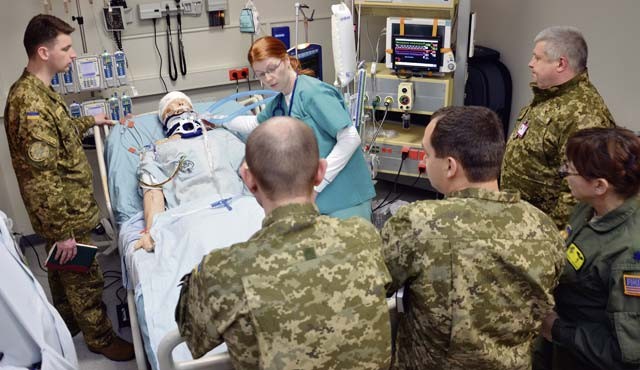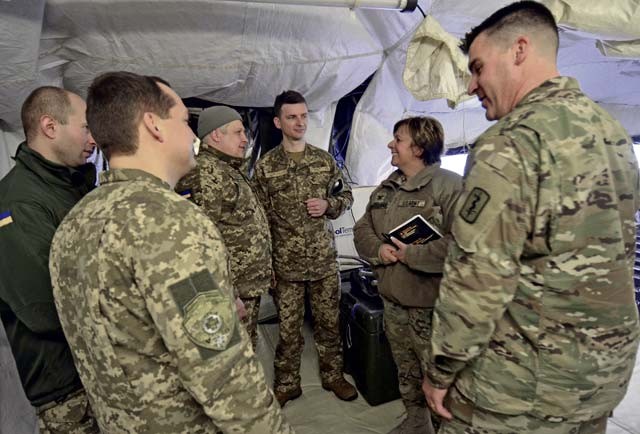
Four Ukrainian military surgeons, the first group of physicians to do such a rotation in several years, recently visited Army Medicine in Europe for a firsthand look at U.S. wounded warrior care.
Ukrainian Army Lt. Col. Mykola Moskvychov, Maj. Serhii Shypilov, Capt. Pavlo Shkliarevych and 1st Lt. Volodymyr Prytula spent four days visiting various sections of Landstuhl Regional Medical Center and the 212th Combat Support Hospital during their trip to Germany Jan. 24 to 29. All four are surgeons with military hospitals in Kiev, Kharkiv and Lviv, Ukraine.
The visit, which was months in planning, was designed to be a shadowing experience for the Ukrainian physicians, said Air Force Col. (Dr.) Robert Fischer, LRMC deputy commander for clinical services. While partnerships are being explored with several NATO and non-NATO nations, this was the first opportunity for an actual engagement to take place.
“We are happy to share how we approach wounded warrior care, how we receive and then evacuate after stabilization care on the hilltop (LRMC) before they go to Role 4 facilities in the states,” Fischer said. “So this is really about exposure to how American military health care is provided to wounded warriors.”
The visit is aligned with both the Regional Health Command Europe goal of increasing medical diplomacy and the U.S. Army Europe commander’s vision of strengthening relationships, training, interoperability and effectiveness of the land forces they enable.
According to Brig. Gen. Van Coots, commander of Regional Health Command Europe, the visit was multifaceted.
“Almost a year ago I was in Kiev along with (USAREUR commander) Lt. Gen. Ben Hodges,” Coots said. “I got to go to the central hospital there, tour it and talk to some of the folks. Out of that came the desire to plan to have you all come to us and start doing these engagements.
“Part of it is an attempt on our part to familiarize you with us and how we practice medicine and what our capabilities are here in Europe as we support you in your struggle,” Coots explained. “Part of it is designed to do some capacity and capability building, particularly in level 2, level 3, level 4 care. Part of it is also to learn from you what it is you would really like to have and what it is you think you really need and how we can provide that to you, and what you can operate with, from equipment to additional training.”
During the visit, the Ukrainian surgeons had the opportunity to view and discuss hospital operations to include Critical Care Air Transport Team, intensive care unit, and the da Vinci surgical robot, the newest addition to LRMC and technology not yet available in Ukraine. They also spent a day with the 212th Combat Support Hospital as they worked under field conditions in their Mobile Early Entry Package, a deployable configuration containing emergency medical services, surgical capability, intensive care services, pharmacy, radiology and laboratory all in one tent.
Throughout the visit, Ukrainian and U.S. medical personnel were comparing notes on the similarities and differences between their respective systems. For their part, the visiting surgeons were hoping to bring back practical information they can use to make improvements in their ability to operate with allied forces.
“We will bring back information and knowledge about the American integrated system,” said Moskvychov, the senior Ukrainian physician. “We personally saw how patients are managed. This is very useful to make for better interoperability. It will be very helpful back in Ukraine.”
Fischer agreed that first-hand experience is the most useful.
“I think seeing us execute our wounded warrior care is better than just discussing this care at a distance and describing our policies and guidelines … actually seeing them in execution, including the movement of patients to and from the hilltop and the flightline at Ramstein, is much more effective in educating these visitors about how it’s actually done on the ground,” Fischer said. “So it goes from principal to action and you tend to remember action better.”
The hope is that these exchanges will continue in the future.
“I want to thank you for being that first group to come, from not just Ukraine but the first group to come and do rotations with us in a long time,” Coots said to the Ukrainian visitors. “Whatever we can do to assist and sustain life on the battlefield is really critical. We want this to be a continual process.”








